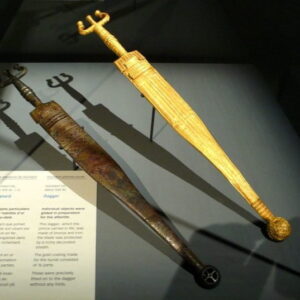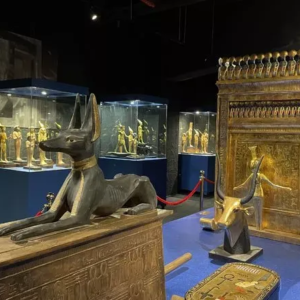Almost 500 years ago, a tall African man arrived in Japan. He would go on to become the first foreign-born man to achieve the status of a samurai warrior.

Known as Yasuke, the man was a warrior who reached the rank of samurai under the rule of Oda Nobunaga – a powerful 16th Century Japanese feudal lord who was the first of the three unifiers of Japan.
In 1579, his arrival in Kyoto, the capital at the time, caused such a sensation that people climbed over one another to get a glimpse of him with some being crushed to death, according to historian Lawrence Winkler. Within a year, Yasuke had joined the upper echelons of Japan’s warrior class, the samurai. Before long, he was speaking Japanese fluently and riding alongside Nobunaga in battle.
“His height was 6 shaku 2 sun (roughly 6 feet, 2 inches)… he was black, and his skin was like charcoal,” a fellow samurai, Matsudaira Ietada, described him in his diary in 1579. The average height of a Japanese man in 1900 was 157.9m (5 feet 2 inches) so Yasuke would have towered over most Japanese people in the 16th Century, when people were generally shorter due to worse nutrition.

Making of a warrior
There are no records of Yasuke’s date or country of birth. Most historians say he came from Mozambique but some have suggested other countries such as Ethiopia or Nigeria. What is known, however, is that Yasuke arrived in Japan with an Italian Jesuit named Alessandro Valignano on an inspection tour, and appears in recorded history only between 1579 and 1582.
Some experts say he was a slave, but it is hard to say. Floyd Webb and Deborah DeSnoo, filmmakers working on a documentary about him, believe assertions that he was a slave to be speculative at best. Webb believed that because of his command of the Japanese language, Yasuke would have been viewed favorably.
“It would have been impossible for Yasuke to rise to the rank of a samurai in just a year without a warrior background,” DeSnoo said. “Samurais often began their training in childhood.”
Friendship with the warlord
Yasuke met Nobunaga shortly after his arrival in Japan and he piqued his interest, the filmmakers say, by being a talented conversationalist. Yasuke already spoke some Japanese and the two men got on well, according to academic Thomas Lockley, who has written a book on Yasuke. According to Lockley, Yasuke entertained Nobunaga with tales from Africa and India, where Lockley believed Yasuke had spent some time before going to Japan.
“He was unlike the Jesuits, who had a religious agenda for the soul of Japan,” Webb said.
The African warrior and the Japanese warlord had a lot in common. Nobunaga was a great fan of the martial arts and spent a lot of time practicing them. He was also an eccentric person, who according to Webb, often dressed in Western-style clothes and sought the company of highly disciplined and intelligent people.
He understood the cultural language of Japan and loved to dance and perform Utenzi – a historic form of Swahili narrative poetry celebrating heroic deeds, Mr Webb adds. This suggests Yasuke could have come from Mozambique, as some historians believe, given that Swahili is still spoken in some northern parts of the country.
Similarly, Nobunaga was a lover of Noh Drama – a form of classical Japanese musical drama – and it is widely reported that he was a patron of the arts. Nobunaga grew fond of Yasuke and treated him like family – the African was among a very select group of people allowed to dine with him.

“Nobunaga praised Yasuke’s strength and stature, describing his might as that of 10 men,” DeSnoo said.
The legend lives on
When Nobunaga bestowed the rank of samurai on Yasuke the idea of a non-Japanese samurai was something unheard of. Later, other foreigners would also obtain the title. As the first foreign-born samurai, Yasuke fought important battles alongside Oda Nobunaga. He was also there on the fateful night one of Nobunaga’s generals, Akechi Mitsuhide, turned against him and set the warlord’s palace alight, trapping Nobunaga in one of the rooms. Nobunaga ended his own life by performing seppuku, a ritual suicide.
Before he killed himself, he asked Yasuke to decapitate him and take his head and sword to his son, according to historian Thomas Lockley. It was a sign of great trust. The legend of Yasuke comes to an end shortly after this, in 1582. The fall of Nobunaga at the hands of a treacherous general resulted in the exile of the first black samurai, possibly back to a Jesuit mission in Kyoto.
Though his fate and the last years of his life remain unknown, Yasuke has lived on in the imaginations of many Japanese who grew up with the award-winning children’s book Kuro-suke (kuro meaning “black” in Japanese) by Kurusu Yoshio. The book, which dramatized Yasuke’s life, ended with a bittersweet note: after Nobunaga killed himself, Kuro-suke (Yasuke) was taken to a temple where he dreamed of his parents in Africa and wept.





